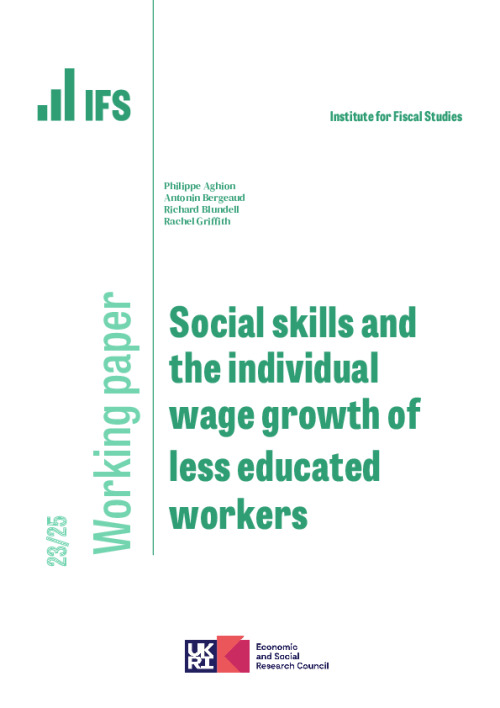Downloads
We use matched employee-employer data from the UK to highlight the importance of social skills, including the ability to work well in a team and communicate effectively with co-workers, as a driver for individual wage growth for workers with few formal educational qualifications. We show that lower educated workers in occupations where social skills are more important experience steeper wage growth with tenure, and also higher early exit rates, than equivalent workers in occupations where social skills are less important. Moreover, the return to tenure in occupations where social skills are important is stronger in firms with a larger share of higher educated workers. We rationalize our findings using a model of wage bargaining with complementarity between the skills and abilities of less educated workers and the firm’s other assets.
Authors

Research Fellow London School of Economics
Philippe is an IFS Research Fellow, a Professor of Economics at LSE, at the College de France and at INSEAD, and a Fellow at the Econometric Society.

Antonin Bergeaud

CPP Co-Director
Richard is Co-Director of the Centre for the Microeconomic Analysis of Public Policy (CPP) and Senior Research Fellow at IFS.

CPP Co-Director, IFS Research Director
Rachel is Research Director and Professor at the University of Manchester. She was made a Dame for services to economic policy and education in 2021.
Working Paper details
- DOI
- 10.1920/wp.ifs.2023.2523
- Publisher
- Institute for Fiscal Studies
Suggested citation
Aghion, P et al. (2023). Social skills and the individual wage growth of less educated workers. 23/25. London: Institute for Fiscal Studies. Available at: https://ifs.org.uk/publications/social-skills-and-individual-wage-growth-less-educated-workers (accessed: 4 May 2024).
More from IFS
Understand this issue

If you can’t see it, you can’t be it: role models influence female junior doctors’ choice of medical specialty
24 April 2024

Why inheritance tax should be reformed
18 January 2024

How important is the Bank of Mum and Dad?
15 December 2023
Policy analysis

Recent trends in public sector pay
26 March 2024

Gap between higher- and lower-paid public sector workers falls by more than a third since 2007 as doctors and experienced teachers have faced unprecedented pay cuts
26 March 2024

Living standards since the last election
21 March 2024
Academic research

Labour market inequality and the changing life cycle profile of male and female wages
15 April 2024

Police infrastructure, police performance, and crime: Evidence from austerity cuts
24 April 2024

Imagine your life at 25: Gender conformity and later-life outcomes
24 April 2024
